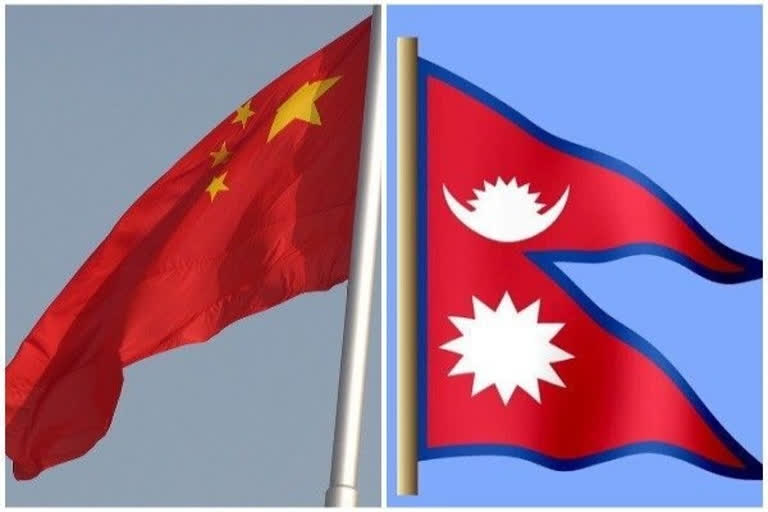New Delhi: Amid the dissolution of Parliament, the power tussle intensifies in Nepal, a deputation of Chinese delegation Guo Yezhou in Nepal to unite the faction of ruling Communist Party of Nepal seems to be elusive. Although China is making efforts to bring unity in Nepal but given the personal interests of Nepal Communist Party (NCP) leaders Oli and Prachanda, it is very unlikely that there would be any conclusion to the party conflict.
Moreover, the visit of the Chinese senior leader in Kathmandu has been viewed as an interference in the domestic affairs of Nepal. Scores of people in Kathmandu are being seen protesting and demonstrating against it, shouting anti-China slogans. Despite criticism for interfering in the country's politics, Chinese leader met top NCP leaders and main opposition Nepali Congress chief Sher Bahadur Deuba.
Where in one hand, China is continuing to mount an all-out effort, if not desperate, effort to salvage lost ground in Nepal, there, on the other hand, India is observing the development in Nepal closely with the concern that there is growing proximity between Nepal and China.
Analysts say that China has high stakes in the unity of NCP which it sees as the most suitable vehicle for carrying forward its geopolitical agenda in the Himalayan nation and it does not add up to a gain for India.
Also Read: High-level Chinese delegation arrives in Nepal to 'take stock' of political situation
Speaking to ETV Bharat, Professor Harsh V Pant of International relations with King's India Institute said, “The two communist parties had merge from this government to form one party at the behest of the Chinese. For China, unity between various factions of the NCP must hold, but it seems more unlikely that it is going to be the case given that personal interests between Oli and Prachanda are diverging. I don't think their grievances can be brought together. Chinese are trying very hard to make sure that the two opposite camps come to a conclusion but it looks very unlikely as the party seems very divided. The factionalism is very high in the communist bloc”.
He says that the Chinese would like the present arrangement to continue i.e the communists should come together and form the government that was established under PM Oli. For China, the break up of NCP is a big diplomatic failure and given that, China sees the communist bloc as important for their engagements in Nepal. China's interest in Nepal has nothing to do with Nepal's development but it has everything to do with how they want to block India in Nepal.
“The anti- India posture of China is a big driver of Chinese behaviour in Nepal and if the present arrangement breaks down, Beijing feels that their equities will be hurt. It is quite extraordinary that they are involving themselves to that extent that they are doing it so 'explicitly'.
The more the Chinese involve themselves, the more pushback would be that they are interfering in Nepal's domestic matters, an argument that was often hurled at India in the past that India interferes too much in the political affairs of Nepal, but India is trying to stay away from the internal turmoil, whereas China is getting more involved in that. Over the long term, this would create damage to China in Nepal because the narrative would be that China keeps on interfering in Nepal's internal matters.
It has become a big factor that apart from the will of the people, it is the will of the Chinese Communist Party as to who becomes the Prime Minister of Nepal. It is certainly going to be problematic but for China, if they do not interfere or push their agenda, then they will lose out. If the present arrangement falls, then it is very likely that those who will run Nepal would look India more favourably then China”, Professor Pant explains.
Another expert Namrata Hasija, a research fellow at the Centre for China Analysis and Strategy in New Delhi opines that Nepal is being led by the communists who are extremely close to the Chinese.
Also Read: 'Nepal leadership change will calm ties with India'
To China yes, a left government is good but they will be happy to have any leader who is favourable to the Chinese. CCP had also started classes for the NCP to train them in the ideological aspects. They had put in a lot of effort to influence the Nepalese left leaders but the Chinese do not understand democracies. It is the people who vote and in Nepal, there have been demonstrations against Oli and Nepalese are not happy with the Chinese interference”, she points out.
India and Nepal share a different and multidimensional relationship. In Nepal of course the act of Oli has again started a period of uncertainty which is not good for India as a stable Nepal would be a good neighbour. But whether any party will emerge as the largest party is also a question. A hung parliament will not be good for Nepal and we have seen that a coalition does not work in Nepal, Hasija further added.
She underlines that China is interested in Nepal of course because of India but also because it shares a border with Tibet. China has started talking about a three-front war with India which means China-Pakistan and Nepal on one side against India. NCP has already served the purpose for which it was groomed by the Chinese. From 2008 Nepal has seen 11 PM'S in total and ever since then, it has been in turmoil.
Chairman of the ruling Nepal Communist Party's rival faction Madhav Kumar Nepal on Tuesday said that the party could still be united if PM Oli was willing to accept his mistakes, as thousands of protesters marched through the streets of Kathmandu against the dissolution of Parliament.



